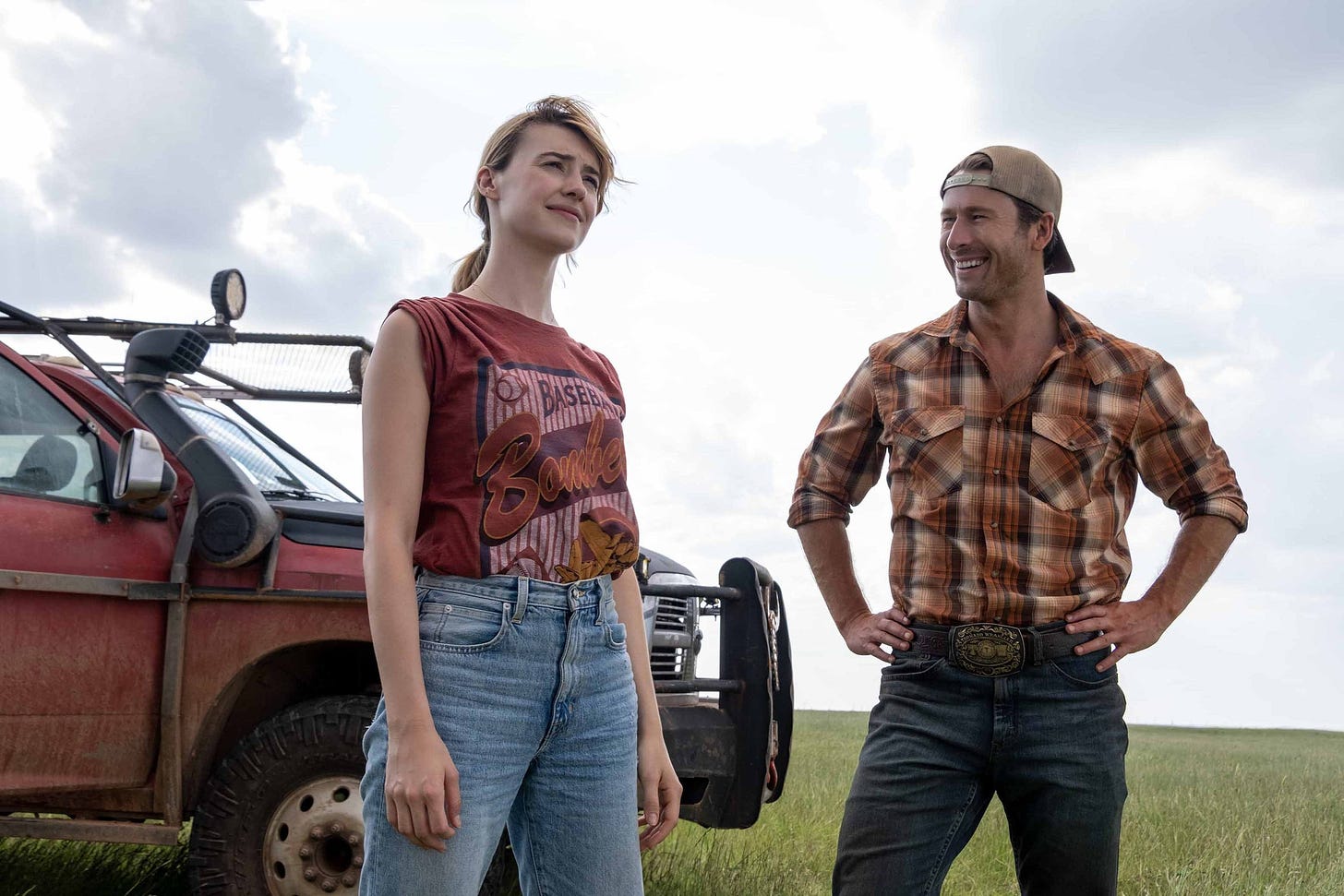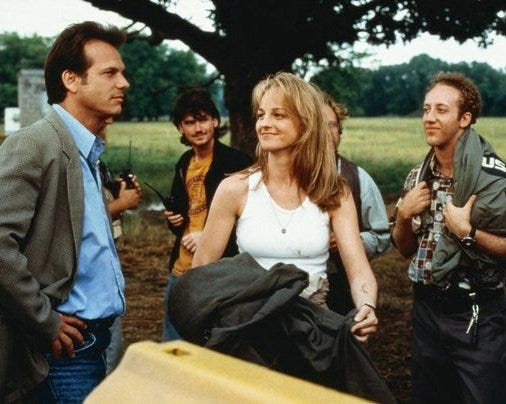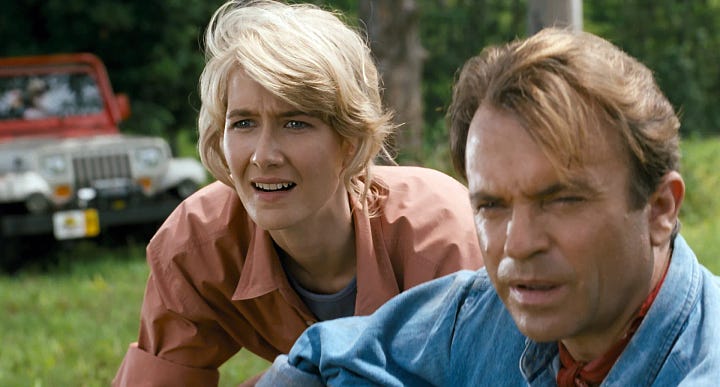The stories we tell ourselves about the future
Dystopian? Utopian? Exploring the spectrum of climate stories.
I’ve been thinking a lot about climate fiction and the stories we tell ourselves about climate change and the future.
There are plenty of dystopian climate stories—Octavia Butler’s Parable of the Sower, J.G. Ballard’s The Drowned World, or The Day After Tomorrow film, which is based off of Art Bell and Whitley Strieber’s book, The Coming Global Superstorm. You don’t need to look to the past for these, either—look at Helen Phillips’ just-published, buzzy new thriller, Hum. We humans love to read and watch dystopian stories.
There are a handful of utopian stories about climate change, especially within the emerging genre of solarpunk—the anthologies, Sunvault and Solarpunk Summers are both on my shelf, along with Becky Chambers’ Monk and Robot series. There are far-future stories, too, especially within hard sci-fi, like Isaac Asimov’s The Foundation series or the Star Trek universe, and softer versions as well, like Ursula K. Le Guin’s Always Coming Home. These stories may acknowledge a dystopian past that humanity survived and thrived beyond, but they are often shaky on the specifics of how we accomplished a transition from doom to flourishing.
Then, there are a slowly growing range of stories that fit somewhere in the middle—neither dystopian nor utopian—that are often near-future speculations on how we get from today to an imperfect, but measurably better future. Kim Stanley Robinson’s Ministry of the Future falls into this camp, as does M. E. O'Brien and Eman Abdelhadi’s Everything for Everyone, An Oral History of the New York Commune, 2052–2072 and Nick Fuller Googins’ The Great Transition. While not as far-reaching in scope or timeline as these stories, I would also nominate the new Twisters film into this category.

I saw Twisters in theaters last month and although it’s not marketed as such—if anything, Warner Bros. and Universal are doing everything they can to avoid marketing Twisters as a climate change film—it’s a climate change film. How could it not be? In a warming world, storms are getting bigger and badder. A super tornado is the embodiment of the Big Bad Wolf coming to blow your house down.
Michael Crichton wrote Jurassic Park and the screenplay for the 1993 film adaptation. Three years later along with his wife Anne-Marie Martin, he co-wrote the screenplay for Twister. Watching those two movies side by side, the similarities in characters, plot, pacing, and tricks are obvious. I love the roller coaster ride of these movies, and even with the nostalgia for the 90s peeled away (as if I could!), they still hold up for me.


But Jurassic Park and Twister diverge in a critical way. Crichton was known for his cautionary tales, of which Jurassic Park is certainly one. Genetically engineer and clone the return of extinct raptors at your own risk!!! But Twister isn’t a cautionary tale at all. It’s the story of science bending nature to its will, yet again. In Twister, the invention of Dorothy unlocks a tornado’s secrets. Twisters takes it a step further. With a dubious geo-engineering cocktail of cloud seeding and spongey polymers, science effectively dominates and neutralizes a super tornado.
What’s the moral of the story here? Science good, or science bad? Or is maybe a little science good, but too much science bad? Crichton seems to veer towards the latter, but the writers of Twisters are firmly in the “science as savior” camp.
I find this all especially fascinating because while watching Twisters, I was immediately aware that this was a film targeted towards red America. During an election year. The cowboy bluster of the male lead, the country music soundtrack, and the notable absence of any mention of “climate change” made this clear. This is no accident, as detailed in this Deadline article, and the strategy has been enormously successful in beating out box office forecasts.
Despite all this, the message of Twisters doesn’t land along a hard political line of left vs. right. There are plenty of people on the political left and right who think science will save us from climate disaster. The fact that a climate change film (that tries to not be a climate change film) can not only land, but sell, in deep red states is good news. While the messaging shift in Twisters is subtle, it shows there are ways to de-polarize a polarized issue like climate change, to tell stories differently, to meet people where they are in ways that feel relatable.
I’m not endorsing Twisters’ takeaway message. While I really enjoyed watching the film, I think geo-engineering is and will continue to be a necessary component of our toolkit of climate change solutions but risks being a bandaid fix that will allow us to procrastinate on the deeper, systematic changes that need to happen. That said, immediately upon returning home from the theater I found my copy of Under a White Sky by Elizabeth Kolbert and started reading.
What I’m writing
Not much and it bums me out. It’s been a very busy and stressful month, personally, professionally, politically (?! how are we all doing??), and I’m starting to prepare for a breast revision surgery in about six weeks. Carving out some time here and there but it may be touch and go until we get into fall. Looking forward to the mini #1000words over Labor Day weekend, though!
What I’m reading
Infinite Ground by Martin MacInnes, The Summer Book by Tove Jansson, I Have Some Questions for You by Rebecca Makkai, The Bright Sword by Lev Grossman, The Future of Humanity by Michio Kaku, and Under a White Sky by Elizabeth Kolbert.
This is what happens when I’m stressed and my focus is limited—my patience is non-existent and I pick up and put down a dozen books, searching for the one that *clicks*.
What I read
All Fours by Miranda July, Are You There God? It’s Me Margaret by Judy Blume, All the Birds in the Sky by Charlie Jane Anders, The God of the Woods by Liz Moore, The Great Displacement by Jake Bittle, and The Familiar by Leigh Bardugo.
Asking for your help!
Many of you may know that for the last four years, I’ve organized a book club about the climate crisis. Maybe that’s how you found my substack! Find out more about our book club here.
For our fifth year, I’ve decided to do something I’ve never done before—select books based on a theme. And the theme is, in a nutshell, Visions of a post-transition future. By “transition,” I mean energy transition, a future where we’re at net zero emissions.
Over the last four years, we’ve read two dozen books that talk about the many-tendrilled problems of climate change and how it is and will affect every nook and cranny of our lives. It’s heavy stuff. And as I work on my own writing and look at the available books that imagine a positive future worth working towards, the offering is bleak. I’ve listed a few earlier in this post (Ministry of the Future was one of the first books we read as a group), but I’m on the hunt for book recommendations about climate solutions and a future that is just, hopeful, and dare I say it—inspiring?
My hope is that by reading a range of stories about a future worth fighting for, we can reverse-engineer a way to get there. Absent of that, current visions of the future are presented as an absence of something, like sacrificing plane travel, or meat, or air conditioning, or more urgently, a loss of home and safety. We need more and better stories that excite us and help us chart a map from here to there.
Have a recommendation? Please drop it in the comments or shoot me an email. Thank you!





Everything for Everyone, An Oral History of the New York Commune, 2052–2072 is one of my favorite books I've read recently. Mulling over your prompt to see if I have anything to contribute.
I think a lot about The Light Pirate, which I know some people criticized as fatalistic, but it really captured my attention and further ignited a sense of urgency... and to me, hope that we do still have time to stop the worst of the climate disasters from happening.